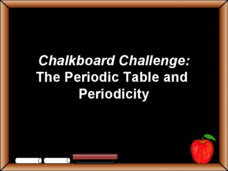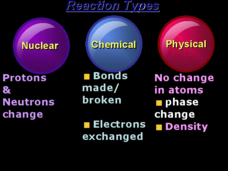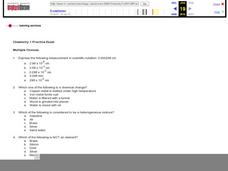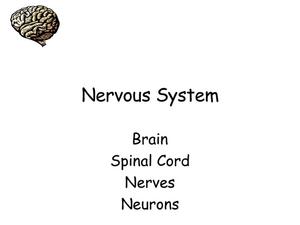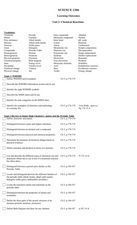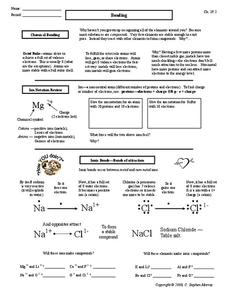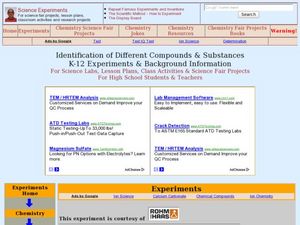Curated OER
Chalkboard Challenge: The Periodic Table and Periodicity
In a well-prepared Jeopardy-style game, your chemisty class can review the periodic table. Questions cover the element groups, some history, atomic number, atomic and ionic radii, electronegativity, and the shielding effect. What a fun...
Curated OER
Chemistry Slide Collection
A huge slide show provides a review of almost every topic there is to cover in basic chemistry! Your young scientists will be interested to see each illustration and example given. The appearance of the 120 slides varies greatly, most...
Curated OER
Charge and Electricity
In this charge and electricity worksheet, students read about electric charges and how they are created in atoms. They also read about the unit of charge, called the Coulomb, conductors, and insulators. Emerging electricians match 11...
Curated OER
Chemistry Midterm Topic Review
In this chemistry review worksheet, students answer and solve 95 questions about chemical reactions, hydrocarbons, functional groups, moles, acids and bases and solutions.
Virginia Department of Education
Chemical Bonds
How are chemical bonds similar and how are they different? Provide your young chemists with the resources to more thoroughly understand the concepts of ionic and covalent bonds. Pupils research these topics, diagram examples of each...
Pingry School
Synthesis of an Insoluble Ionic Salt: A Stoichiometry Experiment
Challenge young scientists to design their own experimental procedures. They write the procedure for properly preparing two grams of a water-insoluble ionic salt. To finish, they perform the experiment and collect data to prove their...
Curated OER
Review Set
The topics covered in these multiple choice questions are about atomic structure and bonding, state configurations, pressure and solution concentration, and energy graphs. This is a midterm review which could be used with the whole...
Curated OER
The Nature of Salt
High schoolers record information from the periodic table for sodium and chloride. They determine whether salts are molecular or ionic compounds, along with sodium chloride's molecular weight, and relative weights
Curated OER
Chemistry 1 Practice Exam
Thirty multiple-choice questions and their answers are provided in this resource. It was written for a general chemistry course and queries test takers on scientific notation, mixtures, chemical symbols, electric charges, Dalton's atomic...
Curated OER
Chapter 12 Worksheet - Ions, Ionic Bonding, anc Covalent Bonding
Four pages provide plenty of problem solving practice for chemistry whizzes. They answer questions and write electron configurations for ions. They use Lewis dot diagrams to display equations. Covalent bonds are explored. The last half...
Curated OER
Nervous System
After reading through this presentation about nerve impulses, students should be able to complete the sentences given with the correct terms and scientific vocabulary. The basics of the ion channel behavior are detailed along with a...
Curated OER
Elements Make Compounds
This presentation starts with safety warnings for an experiment. Students will be introduced to the reaction that happens when magnesium is burned, the chemical background and the energy changes. Excellent examples and labeled reactions...
Science Geek
Periodic Trends
If your pupils think Um is the element of confusion, this presentation on period trends can only help. It covers the patterns for atomic radii, ionization energy, and electronegativity across a period and down a group.
Curated OER
Periodic Table At A Glance
In this periodic table worksheet, students fill in missing information such as atomic number, atomic mass, family name, etc. using the periodic table as their reference.
Curated OER
Learning Outcomes
In this science worksheet, learners explore the learning outcomes for a unit on chemical reactions. Students define 60 vocabulary words and answer a list of questions for each topic.
Curated OER
Periodic Table
In this periodic table and elements learning exercise, students review valence electrons, octet rule, oxidation number, and the difference between metals and non-metals on the periodic table. This learning exercise has 5 matching, 20...
Curated OER
Charge and Electricity
In this electricity worksheet, students read about electric charge, ionic notation, and conductors and insulators. Then students complete 19 matching, 6 fill in the blank, and 2 short answer questions.
Curated OER
Naming and Covalent Compounds
In this compounds worksheet, students practice naming compounds and classifying them as ionic, covalent, or polyatomic compounds. This worksheet has 12 fill in the blank and 12 problems to solve.
Curated OER
Types of Chemical Reactions
In this chemical reactions learning exercise, students are given directions about three types of reactions and how to write balanced equations for each. They then are given ten practice problems to complete using the information given.
Curated OER
Naming and Covalent Compounds
In this naming and covalent compounds worksheet, learners name 12 compounds using a chart of polyatomic ions if needed. They also draw covalent bonds in 6 compounds and answer 6 questions about ionic bonds, covalent bonds and polyatomic...
Curated OER
Types of Chemical Reactions
In this chemical reactions worksheet, students read about the 3 types of chemical equations and how to write balanced ionic equations. Students are given 5 equations to balance, write the type of reaction, write the total ionic equation,...
Curated OER
Bonding
In this bonding learning exercise, students read about the two different types of chemical bonding: ionic and covalent bonds. Students review ion notation and oxidation numbers. This learning exercise has 24 fill in the blank, 2...
Curated OER
Bonding
In this bonding worksheet, high schoolers read about the octet rule in bonding, ion notation, ionic bonds, covalent bonds and oxidation numbers. Students write 2 ion notations, they determine if 8 sets of ions will make compounds, they...
Curated OER
Identification of Different Compounds and Substances
High schoolers conduct a series of tests to identify unknown compounds. In this chemistry lesson, students compare the physical and chemical properties of substances. They collect data and formulate a conclusion.


